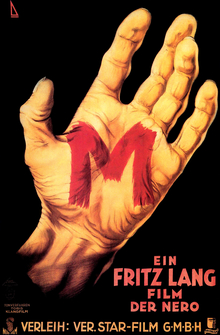Pages
▼
Wednesday, May 11, 2016
M (Fritz Lang, 1931)
Point of view is everything in a thriller. Let the viewer see events through the wrong eyes, and suspense goes out the window. The remarkable thing about Lang's great thriller is that the point of view changes so often. It starts with that of anxious parents, knowing that a child-killer is on the loose, then narrows to one particular parent, waiting for her daughter to come home from school for lunch. But then we see the object of her fears, her daughter, making contact with a strange man, and our suspense builds as we return to the worried mother. But as strongly as we sympathize with the mother, we also eventually learn to focus our anxieties elsewhere: on the beleaguered police, on innocent victims of people's suspicions, on the criminal underworld harassed by the police, and eventually even on the murderer himself. There are even moments when, as he becomes the object of the manhunt, trapped in the attic of a building swarming with the criminals in search of him, we find ourselves semi-consciously rooting for him to escape. Then we find ourselves rooting for the criminals to capture him and to escape being caught by the cops. And then, when he is put on trial by the criminals, we root for the police to arrive and rescue him. In short, the movie is a study in the ways in which sympathy can be manipulated. Lang and his soon-to-be-ex-wife Thea von Harbou wrote the screenplay, and the atmosphere of the film is superbly maintained by the cinematography of Fritz Arno Wagner and the sets of Emil Hasler and Karl Vollbrecht. But none of it would work without the presence of some extraordinary performers, starting with Peter Lorre as the sniveling, obsessed Hans Beckert: a career-defining performance in many ways, considering that Lorre had been known for comic roles on stage before Lang made him a movie star. Then there's Otto Wernicke as Inspector Lohmann, whose performance was so memorable that Lang brought him back as the same character in The Testament of Dr. Mabuse (1933), stereotyping Wernicke as a cop for much of his career. And Gustav Gründgens, the imperious leader of the criminal faction, who later became identified with the role of Mephistopheles in stage and screen versions of Goethe's Faust (Peter Gorski, 1960) -- not to mention in Klaus Mann's 1936 novel, Mephisto, based on Gründgens's embrace of the Nazis to advance his career.
Charles Matthews
